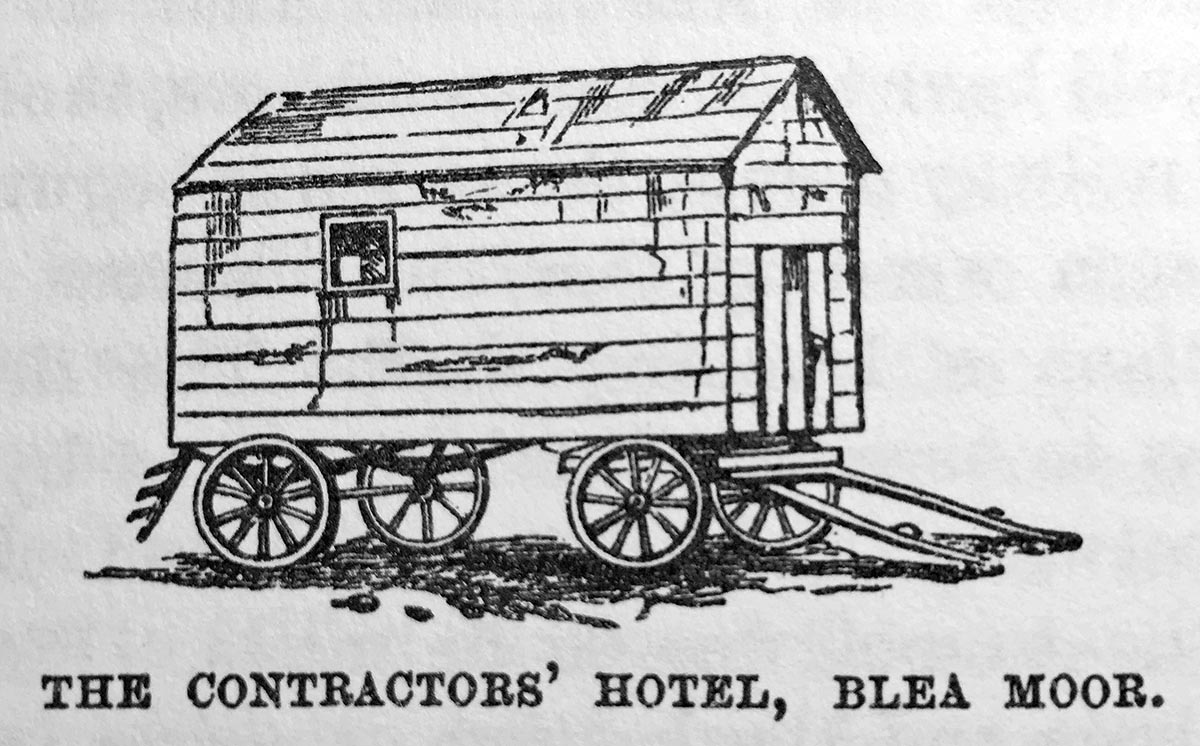Source: "The Midland railway: its rise and progress. A narrative of modern enterprise" by Frederick Smeeton Williams, published by Strahan & Co London (1876). The following extracts are from pages 489-493:
Image 1

Four miles from Selside we cross the turnpike that runs from Ingleton to Hawes; and now the heaviest part of the works begins. The changes here made by the construction of the railway have been stupendous. A few years since, not a vestige of a habitation could be seen. The grouse, and here and there a black-faced mountain sheep, half buried among the ling, were the only visible life. Beyond the valley lay the great hill of Blea Moor, an outlying flank of the mighty mountain Whernside, covering 2000 acres of land, where sundry farmers feed their sheep according to the number of "sheep gaits " they possess. A few months afterwards, dwellings had been erected for the 2,000 navvies who were to work at the viaduct and tunnel, and £20,000 worth of plant had been put upon the ground before the works could be commenced. We may add that the principal owner of the moor required the Company to bury their telegraph wires, in order to prevent injury to his grouse when on the wing. . . . This is the moorland town, if by such a title it can be dignified, of Batty Green.
. . . The town of Batty Wife had, when we visited it, a remarkable appearance. It resembled the gold diggers' villages in the colonies. Potters' carts, drapers' carts, milk carts, greengrocers' carts, butchers' and bakers' carts, brewers' drays, and traps and horses for hire, might all be found, besides numerous hawkers who plied their trade from hut to hut. The Company's offices, yards, stables, storeroom, and shops occupied a large space of ground. There were also the shops of various tradespeople, the inevitable public-houses, a neat-looking hospital, with a covered walk for convalescents, a post-office, a public library, a mission house, and day and Sunday schools. But, despite all these conventionalities, the spot was frequently most desolate and bleak. Though many of the men had been engaged in railway making in rough and foreign countries, they seemed to agree that they were in "one of the wildest, windiest, coldest, and dearest localities" in the world. The wind in the Ingleton Valley in the winter was so violent and piercing that for days together the bricklayers on the viaduct were unable to work, simply from fear of being blown off. At the present time, though the viaduct is wide and well protected by substantial parapets, such is the fury with which the western winds blow up the hollow between Whernside and Ingleborough that it is averred that it would be at the risk of one's life for a person in such weather to walk over alone.
On so desolate a field of operations, it was of course necessary that accommodation should be secured for the workmen. The Midland Company are renowned for their hotels - of which they have three, in London, Derby, and Leeds; their contractors now provided a fourth, of which we are happy to give an engraving. It was what one of Mr. Charles Dickens's friends would call "a wan"; what the reader, with more decorum, would perhaps designate a "caravan," on four wheels, resembling those vehicles in which certain peripatetic pot and brush sellers take up their residence, and from which they dispense their wares to a confiding public. Here ten contractors' men lived for many months hard by the Ingleton road; and from thence they sallied forth day by day to their work.
In addition to the spacious and cheerful accommodation thus provided, some tents were erected on the hillside of the future tunnel, the materials for which were carried on donkeys' backs."
Acknowledgements
The image of the caravan was obtained from an original copy of the book held in the collection of Midland Railway Study Centre in Derby. It was kindly supplied by Dave Harris, the Study Centre Co-ordinator.
